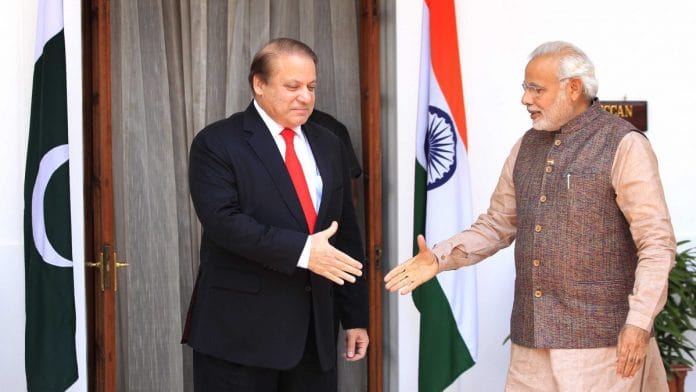ThePrint asks:
Will India-Pakistan tensions rise in the run up to 2019 elections?
For many years, I was directly handling India’s relations with Pakistan, Afghanistan and Iran. In my ten years of experience, if there was one thing I learned, it was that you could never, with any certainty, predict which way India-Pakistan ties will go.
In 1988, Rajiv Gandhi, the then Prime Minister, visited Pakistan for a SAARC conference, and again in 1989 for a bilateral meeting. This was followed by public euphoria; a young post-Partition generation was happy that ties with Pakistan were finally going to improve.
But within a few months, the cooperation turned into rhetoric of tension, accusation and counter-accusation. By the early 1990s, we saw enhanced terrorism in Jammu and Kashmir, supported by Pakistan. Relations really deteriorated after that.
In 1999, Atal Bihari Vajpayee made the historic journey to Lahore. Yet again, a public perception surfaced that leaders were trying to take relations in a different direction. It was significant that this happened after the 1998 nuclear tests. An atmosphere of increased communication and cooperation returned.
However, what followed within months were incursions in Kargil, orchestrated by the Pakistan Army chief General Pervez Musharraf. In 2001, there was an attack on our Parliament by terrorists trained and equipped in Pakistan. There was mobilisation on borders. Operation Parakram was launched.
Here are other sharp perspectives on the question:
Salman Bashir, Pakistani diplomat who served as the former high commissioner to India
Ajai Sahni,Executive Director, Institute for Conflict Management
Suddenly, in 2003, when PM Vajpayee said he was willing to extend a hand of friendship to Pakistan, the relationship took a different turn. There was an easing of tension. Many people have described the phase from 2004-2007 as among the best for the India-Pakistan relationship. There were confidence-building measures, a full ceasefire, with both the countries trying to find a way forward.
The attack in 2008 in Mumbai turned the relationship topsy-turvy again.
The point is that there are so many factors at play in the India-Pakistan relationship that what direction it will take is very challenging to predict.
However, if I evaluate the situation, at this stage, it looks difficult that we’ll see much progress between now and 2019.
First, the leaders in Pakistan are more preoccupied with their own imminent elections. Right now, there is a very weak government. Till a new government is formed, it is tough to herald a significant possibility of improvement.
Second, by the time that government gets established, we will be looking at the election process in India. That brings its own compulsions and challenges.
But more importantly, whatever may be the government in Pakistan, the reality is that it is the army that essentially rules from behind the scenes. The preferences and policies advocated by the army take precedence. The army institutionally benefits from a scenario of managed tension in the Indo-Pak relationship. Unless there is a strong civilian government, which wants to reorient the relationship, this approach will continue.
Right now, we’re witnessing a strong adversarial approach between the two countries, and an improvement in relations looks tough. However, let us not forget that history has taught us that the India-Pakistan relationship is as volatile as it is unpredictable.
Arun Singh is former Indian ambassador to the US






